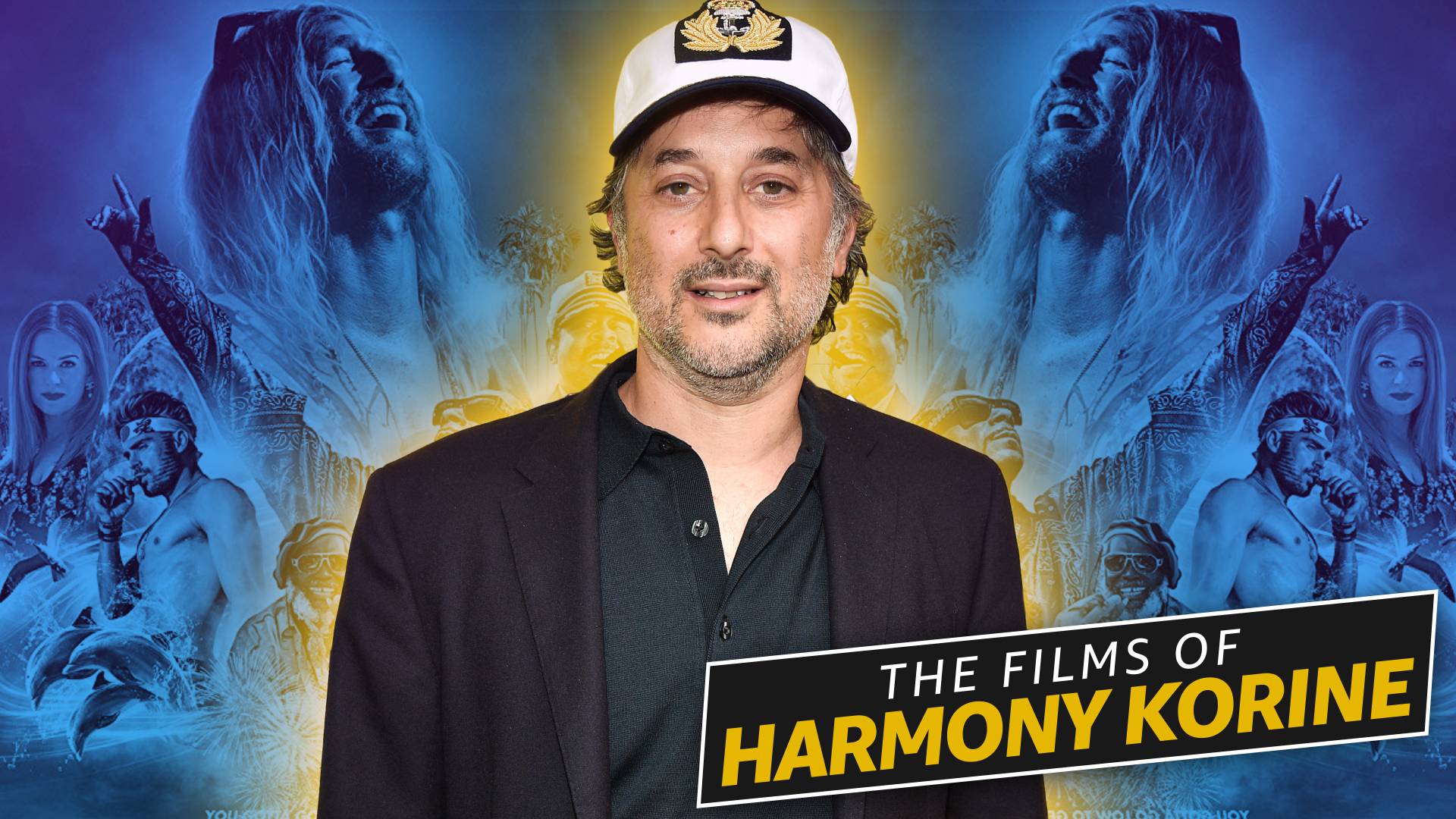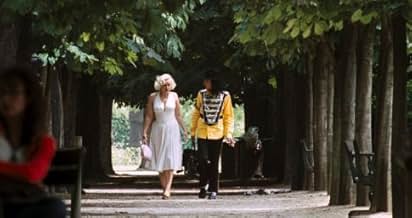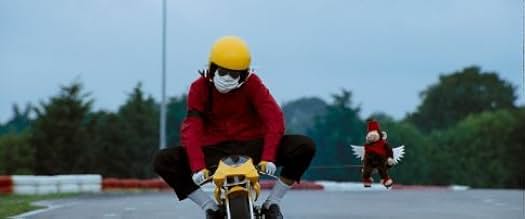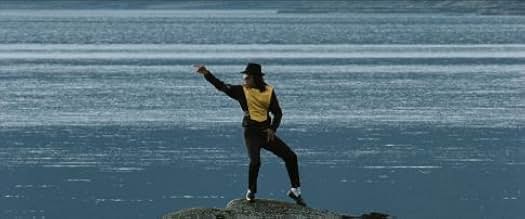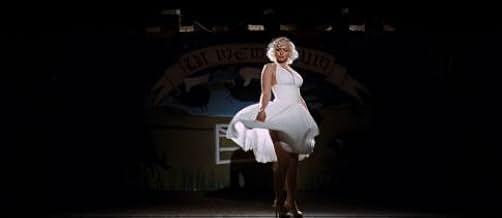A Parigi, un giovane americano che lavora come sosia di Michael Jackson incontra Marilyn Monroe, che lo invita nella sua comune in Scozia dove vive con Charlie Chaplin e sua figlia, Shirley ... Leggi tuttoA Parigi, un giovane americano che lavora come sosia di Michael Jackson incontra Marilyn Monroe, che lo invita nella sua comune in Scozia dove vive con Charlie Chaplin e sua figlia, Shirley Temple.A Parigi, un giovane americano che lavora come sosia di Michael Jackson incontra Marilyn Monroe, che lo invita nella sua comune in Scozia dove vive con Charlie Chaplin e sua figlia, Shirley Temple.
- Premi
- 2 candidature totali
- Buckwheat
- (as Michael Joel-Stuart)
Recensioni in evidenza
This story is told against another story of nuns who want to jump without parachutes from an airplane to prove the possibility of miracles (as legend claims did happen once) Needless to say this has ripe opportunities,especially when you have Werner Herzog playing the pilot. (Korine says the scene with the man waiting for his wife to return to the airport is an actual caught conversation. THIS you have to see to believe). At the screening I attended, an very odd fan's comment to Korine was simply; "Nuns floating dead on a beach. Awesome image man.Dude you rock". Korine says the two stories are really the same thing. Hmmm - I guess so.
Putting the great, great Samantha Morton together with Herzog, Richard Strange, Leos Carax (Pola X), Anita Pallenberg, Diego Luna, and James Fox - matches any casting coup by John Waters. The story may be criticized as forced and ridiculous, but Korine is willing to take bold chances, to mix it up and. with the help of great actors and wonderful cinematography he create of a work of real cinema poetry.
'Mister Lonely' (beautifully depicted in the opening sequences under the credits as a child who cannot be what he is told to be) is a young man who takes on the persona of Michael Jackson (Diego Luna), performing dance movements on the streets of Paris as a busker. He encounters a like person who lives impersonating Marilyn Monroe (Samantha Morton) and before long the two are off to a Highlands commune in Scotland, populated with full time impersonators such as a foul-mouthed Abraham Lincoln (Richard Strange), Charlie Chaplin (Denis Lavant), The Pope (James Fox), Father Umbrillo (Werner Herzog), Sammy Davis, Jr. (Jason Pennycooke), the current Queen Elizabeth (Anita Palenberg), Little Red Riding Hood (Rachel Korine), James Dean (Joseph Morgan), Madonna (Melita Morgan), and flying nuns among others. The story is less a plot than a celebration touched with a bit a angst of how the unnoticed people in the world find a source of belonging by embracing imagination.
The film is choppy and loses some of its potential allure from the editing. The cinematography by Marcel Zyskind captures some truly beautiful moments and the musical score by Jason Spaceman with the Sun City Girls adds a lyrical air to this surreal romp. For lovers of Harmony Korine this movie will please. For viewers with limited attention spans (running time is 112 minutes) the film begs indulgence. Grady Harp
The film is about a lot of ordinary people who are celebrity impersonators. The film mainly follows Michael Jackson (Diego Luna) and Marilyn Monroe (Samatha Morton), but there are other ones, such as Charlie Chaplin, James Dean, Little Red Riding Hood, Abraham Lincoln, The Three Stooges, so on and so forth. And they all live together in a desolate mansion and they own sheep, who eventually get infected.
The impersonators live on their own and clearly have aspirations about what they're doing. They don't have much of an audience, although they like to think that they do. Since this is a Harmony Korine film, we can't expect the storyline to carry the film. There are a lot of other elements at play here and the story is merely the background or the canvas for which he uses to paint all over. There is clearly some Malick and Herzog influence at work here and its nice to see dashes of the Harmony Korine we've all come to know.
Unfortunately when the film concludes we're not exactly sure what to take from it, or we felt while we viewed it. While there were certainly some gorgeous shots and some haunting and lasting images, its difficult not to feel that as a film, not everything worked. With a film like Gummo, Korine was able to explore a vast amount of characters and dialog among the backdrop of a fictionalized Xenia, Ohio. Here, we have the celebrity impersonators as well as a priest and a group of nuns in a plane.
What seems to be at play here are a combination of Korine's views of famous American figures, his brief thoughts on religion and fate and who we are as people. As Roger Ebert pointed out, there is this tragic feeling beneath the surface in regards to humans. Are these impersonators going nowhere in life or is this all they can get out of life? Should they learn to love this or shall they die seeking more? These questions are evoked but not completely answered and its nice to think about these things.
Werner Herzog, who actually plays the priest in the film, has the brightest presence and elevates the film whenever he's in it. The actors don't have too much to do, other than stand there and impersonate whoever it is they're impersonating. We can't relate to the characters themselves but merely just the idea of them, and perhaps that makes the viewing experience a little less pleasant. Why is Chaplin acting the way he is towards Marilyn? Why does Buckweat pretend to raise chickens? Do these things have meaning or do they not? What stops this film from being a complete mess are the ideas behind it and the images contained within it. While this can safely be acknowledged as an original and provoking experience, it offers little in entertainment value to the viewer and if anything, complicates our ability to process the film. It is worth watching just for the beautiful moments, such as a nun falling out of the sky and Marilyn Monroe standing in the forest, holding her dress down. But does that shape an entire experience? Not necessarily. There are things to admire here but it's hard to completely admire the picture as a whole.
"Mister Lonely" also features a second thread running parallel and seemingly unconnected with the main storyline. It tells the story of a group of nuns, who believe that through the power of faith they are able to fly. Their pilot - a catholic priest Father Umbrillo is adorably played by Werner Herzog, a adequate comrade in arms for Korine given the strong metaphysical essence of his work. Albeit seemingly disparate, the two interloping stories basically deal with the same issue of striving to become an ideal - through faith fulfilling the will of god or by imitating the semblance of perfection of the impersonated celebrity.
The theme chosen for his career reboot seems like very fortuitous and ripe for the picking by a avantgarde artist such as Corine. Dealing with a relatively abundant production budget Corine pulls no stops to deliver a visually perfect movie, proving beyond a doubt his immaculate taste for picture and music, seamlessly constructing beautiful albeit absurd imagery (Michael Jackson riding a mini bike to the song "Mister Lonely", flying nuns of BMXs or face-covered yoga training). Astounding vivid and mesmeric with a strong premise the overall artistic success is pretty obvious, especially in comparison the the raw predecessors. Albeit not entirely style over substance Corine fails to balance the ideas and images with a passable story. No longer a chaotic collage of relatively unconnected scenes ("Gummo"), structured around the island community "Mister Lonely" feels overly improvisational and uninspiring, as if guided by a belief that populating the movie with oddballs (in true Wes Anderson hollowness) and quirking up the ante will suffice to keep the audience intrigued for two hours. The characters themselves are uninspiring, once the novelty of their wackiness wears off becoming a group of doubly faceless individual (neither truly the personas they attempt to recreate nor fleshed out individuals behind the mask).
The grading for Corine is somewhat generous given my issues with his efforts, much owed to the admiration of topics touched as well as some utterly magnificent scenes. To some extent the flying-nuns storyline offers just compensation for the ramblings on in other sequences. A well toned, beautifully portrayed effort with a grim overtone, featuring an unbelievable entry scene, where Werner Herzog donned as a priest confronts a man over his unfaithfulness. Apparently a true event it transcends the overall value of the movie, however capturing an unmistakable feel of Herzog's documentary endeavours and strictly pointing in which direction Corine seems intent on heading.
The biggest misstep however is a pretty ridiculous reinvention of Paul Thomas Anderson's "Wise Up" sequence... albeit with a different song and sung by a bunch of talking eggs...
Lo sapevi?
- QuizIn an interview with a newspaper in his hometown of Nashville, Tenn., Harmony Korine stated that he made several trips to Iceland to scout locations for the film. He ended up ditching that idea altogether and shooting the film in Scotland and France.
- BlooperThe shape of the nuns' parachutes are visible as they are falling from the plane.
- Citazioni
Michael Jackson: I don't know if you know what it is like to want to be someone else, to not want to look like you look, to hate your own face and to go completely unnoticed. I have always wanted to be someone else. I have never felt comfortable the way I am. All I want is to be better than myself, to become less ordinary and to find some purpose in this world. It is easier to see things in others, to see things you admire and then try and become that. To own a different face, to dance a different dance, and sing a different song. It is out there waiting for us, inviting us to change. It is time to become who we are not. To change our face and become who we want to be. I think the world is a better place that way.
- ConnessioniFeatured in Durch die Nacht mit...: Harmony Korine und Gaspar Noé (2010)
- Colonne sonoreMr. Lonely
Performed by Bobby Vinton
(p) 1962 Sony BMG Music Entertainment Inc.
Licensed courtesy of Sony BMG Commercial Markets (UK)
Written by Bobby Vinton / Gene Allen
Published by © 1962 Ripley Music Inc.
Licensed by Edward Kassner Music Co. Ltd
Used by permission, all rights reserved
I più visti
- How long is Mister Lonely?Powered by Alexa
Dettagli
- Data di uscita
- Paesi di origine
- Lingue
- Celebre anche come
- Mr. Lonely
- Luoghi delle riprese
- Aziende produttrici
- Vedi altri crediti dell’azienda su IMDbPro
Botteghino
- Budget
- 9.500.000 USD (previsto)
- Lordo Stati Uniti e Canada
- 167.396 USD
- Fine settimana di apertura Stati Uniti e Canada
- 16.769 USD
- 4 mag 2008
- Lordo in tutto il mondo
- 407.674 USD
- Tempo di esecuzione1 ora 52 minuti
- Colore
- Mix di suoni
- Proporzioni
- 2.35 : 1





